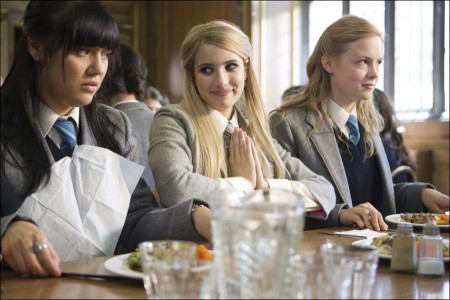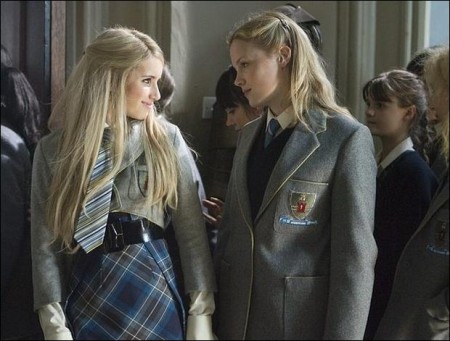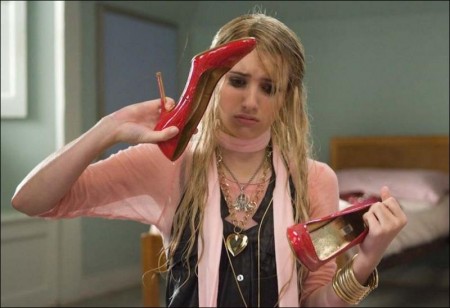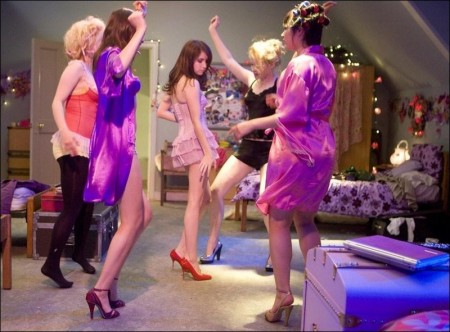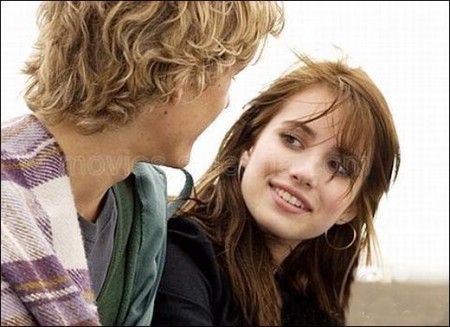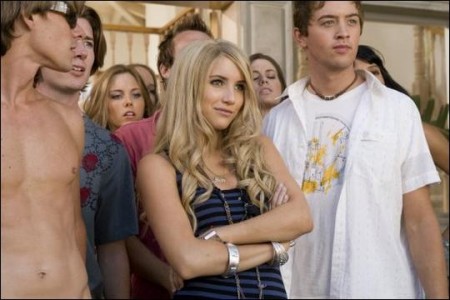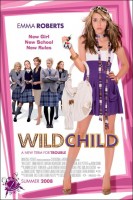Tagline: New Girl. New School. New Rules.
When 16-year-old Malibu princess Poppy (Emma Roberts) trashes her beach front home in order to “welcome” her dad’s (Aidan Quinn) new fiancée, he carries out a long-promised threat to send her away to boarding school in York, England. There, she’ll finally learn the scholarship, fellowship and loyalty that have so far eluded her.
Very much a fish out of water, Poppy gets off to a royal bad start at the Abbey Mount School for Girls. She refuses to acknowledge the authority of snobbish and cruel Head Girl Harriet (Georgia King) and makes an instant enemy of the fifth-generation Abbey Mount student. She also fails to see the point in bonding with her schoolmates. Why bother? Poppy intends to be out of there and back to the beach in a few weeks anyway.
Several of her roommates-Drippy (Juno Temple), Kiki (Sophie Wu) and Josie (Linzey Crocker)-give Poppy the cold shoulder once her outrageous behavior starts costing them privileges. But the most mature of the girls, Kate (Kimberly Nixon, extends an olive branch when Poppy confides that her mother died in a car accident five years ago and she’s been struggling since. Naturally, the girls decide to help their wounded American sister get back home by aiding her in an expulsion.
Let Operation Freedom begin. When a series of audacious, humorous pranks doesn’t result in punishment from the school’s headmistress, Mrs. Kingsley (Natasha Richardson), the girls quickly realize they have to up the ante. Kate suggests Poppy target Mrs. Kingsley’s son, Freddie (Alex Pettyfer). The last girl caught snogging with him was sent packing.
When Harriet discovers Poppy is making the moves on Freddie, she’s furious. She’s always had a crush on him and (in her mind) is the rightful recipient of his affections. As Poppy challenges all Harriet holds sacred, the queen bee begins a campaign of sabotage. She has two intentions: leave Poppy friendless and Freddie-less.
Meanwhile, to take her mind off her troubles, Poppy gets in the swing of school life. When challenged by Mrs. Kingsley to make an effort, she launches into training the lacrosse team… American style. Poppy begins to understand her new friends are genuine and truly care about her-versus the vapid hangers-on she left behind at her old high school. All her efforts to leave the academy, particularly her flirtations with Freddie, make her realize that happiness at Abbey Mount might be in her grasp.
Furious at losing her power, Harriet forges emails that suggest Poppy has been using everyone for her own advantage-laughing at the idiocy of her new friends and the foolishness of Freddie. All her mates are hurt and devastated by the lies. Utterly forlorn, Poppy retreats to a quiet corner of the kitchen. She sits in misery, nervously flicking her souvenir lighter. Absorbed and unthinking, she lights a thread at the bottom of the kitchen curtains, and they accidentally alight. Horrified, she quickly puts out the fire and runs from the scene, leaving her lighter behind.
Though Poppy thinks she put out the fire, it has unfortunately been relit. It spreads and chaos ensues throughout the school. She confesses to Mrs. Kingsley and, after doing so, discovers a lacrosse team photo from 1977 and learns her mother both went to her school and was captain of the team. Mrs. Kingsley has no choice but to propose her for expulsion before the school honor court, a trial by peers system. Fortunately, Kate and the other girls have finally realized the emails were doctored and show up to support their close friend.
During her interrogation of Poppy, Harriet accidentally trips up and reveals her own role in restarting the fire. Poppy is found innocent and then leads her team to a triumphant lacrosse win. While on holiday back home, a blissful Poppy and her newly happy dad relish the enjoyment Freddie and the girls find at their taste of the wild child’s world. She realizes the value of her lessons at the Abbey Mount and understands she has finally become the young woman her mother dreamed she’d be.
Two Generations of Bad Girls
Screenwriter Lucy Dahl based her script for Wild Child on two quite different eras in her life. As a girl, she attended boarding school in England, and as an adult, she lived in Los Angeles and became the mother of teenage daughters. As she observed the behavior of her children and their school friends, she grew fascinated by their culture… and the similarities of young women across generations.
When imagining Wild Child, Dahl drew from a difficult time in her life about which she is not so proud. She relates, “I wrote the screenplay based on my antics when I was at school. I did actually set my school on fire, and I was expelled. I did have a real Mrs. Kingsley [the headmistress], and she was lovely.”
Her mentor’s feelings toward Dahl changed the day she learned what happened. Notes the screenwriter: “She was just so disappointed when she found out that I had done it. I called my Dad the day afterwards-because we didn’t get caught right away-and I said, `Someone set fire to the school last night!’ My Dad called Mrs. Kingsley and said, `There’s a maniac in your school! You’ve got to find her and get her out.’ He was a bit embarrassed when he found out it was me.”
Lucy was not the only Dahl in her family who was prone to acting up and upon whom the characters of Poppy and her clique were based. As she recalls, “I wrote it when I had teenage daughters in L.A. Girls at that age can be so horrible to each other. I’ve seen it and been the mean girl myself, and when you get older you just think, `Girls, girls, girls…don’t do it!’” Naturally, with all difficulty, there was humor to be found.
Working Title Films’ Tim Bevan and Eric Fellner responded to the coming-of-age tale and dark humor in Dahl’s script. Offers Bevan, “Wild Child is a fun and fresh departure for us, being the first film we have made specifically for teenage girls. We were drawn by Lucy’s sparky screenplay and the opportunity to show off the talents of a new emerging group of young actresses, led by Emma Roberts.”
Bevan and Fellner asked producer Diana Phillips to work alongside them for the film. As an American living in London and the mother of three daughters, Phillips had a solid understanding of the issues young girls faced as they grew up…and what it felt like to be a fish out of water.
Based on his longstanding relationship with Working Title, prolific editor Nick Moore was brought on to the project as a first-time director. This was the next logical step for the man who had edited a string of commercial and critical hits-including Notting Hill (starring another famous Roberts), About a Boy, Love Actually and Nanny McPhee-for the studio.
As Phillips suggests, Moore’s reputation as an established romantic comedy editor made him a natural fit to helm his own film. “Nick brings so much to the film from his perspective as an editor. His reputation as an amazing editor, much deserved, really does show up in his plans and preparations for the shooting.”
With its comedy, heart and universal themes of growing up and loss, Wild Child’s script struck a chord for Moore. He also saw in Dahl’s work an opportunity to create a film that would appeal to both American and British filmgoers, as well as audiences across the globe.
The filmmaker liked the throughline of teenagers coming to terms with the people they are becoming. He especially enjoyed Poppy’s arc of growing closer to her father again after her mother’s death devastated their family. “There’s a good moral story in there,” Moore provides. “Poppy wasn’t bad; she was a bit lost and needed to find herself.” He admits, however, “I also like to be cheered up by movies; it’s important to send people away feeling positive. If you’re crying a little and then a joke comes along, the joke’s all the better. Or if you’re laughing and then there’s an emotional bit, it feels sweeter.”
With the script set and the director chosen, the filmmakers would begin the search for a spoiled Malibu princess and a band of girls brought in to her life to, alternately, tempt and save her.
Casting the Film
When it came to selecting the lead role of Poppy, it was important to find a young American actress who could play a self-obsessed, pampered southern California socialite, as well as convincingly carry off a gradual transformation into a considerate, fresh-faced English schoolgirl. In popular teen actress Emma Roberts, Moore and the producers found the perfect blend. With a resume that includes Unfabulous, a successful Nickelodeon television show about the trials of a teenage girl, as well as the big-screen adaptation of Nancy Drew and the comedy Aquamarine, Emma Roberts was just the young woman for the part.
Phillips says, “This movie wasn’t going be made unless the perfect Poppy was found, and Emma stood out as a movie star. She was incredibly natural. She’s a real professional and has had her own TV show for a few years. It was the perfect movie for Emma at this stage in her career, and she’s proven to be incredible.”
For the performer, Poppy was the type of girl she’d often seen while working in Hollywood. Roberts was delighted at the chance to take the fake-tanned, bleach-blonde brat on the journey from the comforts of her swank Malibu home to the perceived confines of an English boarding school. The actress liked that Poppy, for the first time, would be forced to become accountable for her actions.
Roberts offers: “When she first gets to England from L.A., Poppy is a spoiled L.A. girl who just doesn’t want to be bothered with anything; then she starts a transformation when she gets there. She’s kind of mean but nice, deep down. I loved the character and the story. I have never played a character like Poppy before, so it was really cool to play someone different.”
Aidan Quinn was cast as Poppy’s long-beseiged father, Gerry. After reading Dahl’s screenplay, the father of two girls knew he wanted audiences to not only laugh through the film, but also find the humanity he saw in it. Quinn provides: “I hope the audience gets wrapped up in the emotions of the story and the feeling of what it is to be a teenager that’s troubled-then finds her way through it with friends, family and a degree of discipline and direction.”
Asked to portray the glamorous, yet formidable, headmistress Mrs. Kingsley was British performer Natasha Richardson. Too, Wild Child would not be the first time Richardson had worked with Quinn, her co-star in the critically-lauded adaptation of Margaret Atwood’s landmark “The Handmaid’s Tale.”
Richardson wasn’t only impressed with the screenplay, she was keen to work with a first-time director who was receptive to the feedback that she and her fellow performers offered. The actor enjoyed the fact that Moore married his skills as a seasoned editor with a receptiveness to input from cast and crew. Indeed, Richardson felt those attributes contributed to the relaxed atmosphere on set and allowed for better comedic performances.
The students at Abbey Mount School for Girls are supervised by the diminutive but strict Matron, played by Scottish actress Shirley Henderson. Poppy valiantly battles against Matron’s rules and finds herself head-to-head in a losing battle with the disciplinarian.
Henderson has spent much of the past decade as a boarding school student herself, though as a young girl who has been long-departed. As the ghostly Moaning Myrtle in the Harry Potter film series, the actor was well familiar with the trials of filming academy life. This production, however, reminded her of just what it felt like to be a student. She recounts of her time in school, “I used to get in to a lot of trouble because I was very small and very young for my age. I always used to stand up for myself and just quietly got through it.” Just like Poppy, Henderson admits, “I wasn’t a fan of school; it wasn’t my favorite place to be, but I just put my head down and got on with it.”
Along with the adults in Poppy’s world, it was as important to find the correct ensemble of young British actresses to play alongside Roberts. As her fellow classmates, they needed to be a group of girls that a young audience would identify with and believe would actually populate the academy.
Director Moore says, “Finding the girls was tough. These are parts for young girls, and so the actresses wouldn’t have necessarily had very much experience on screen. The important thing for us was to make sure that there was a group that you believed. We flew Emma over for a few days and had a whole bunch of girls try out. We tried different combinations until we felt we had the best ensemble.”
The casting process led to the mates with whom Poppy begrudgingly shares a dormitory room. Before becoming friends with them, the young American is the bane of existence to the mature Kate (Kimberly Nixon), easily flustered Drippy (Juno Temple), computer savy Kiki (Sophie Wu) and practical lacrosse player Josie (Linzey Crocker).
Poppy’s arch nemesis, the Head Girl named Harriet, is played by Georgia King. Ruby Thomas and Eleanor Turner-Moss portray her sidekicks, Jane and Charlotte. Finally, Rusty O’Hara was cast as Harriet’s much-abused school minion. When it came to selecting the actor to play Poppy’s love interest, Mrs. Kingsley’s son Freddie, the production turned to Alex Pettyfer, star of the spy thriller Alex Rider: Operation Stormbreaker. Pettyfer was chosen as the perfect young man to turn Poppy’s head. Unfortunately, he also happens to be the object of Harriet’s unrequited affections.
Other staff include Daisy Donovan as the nice-but-naïve sports teacher, Miss Rees-Withers; Nick Frost as Poppy’s genius hairstylist, Mr. Christopher; Jason Watkins as the incompetent French teacher, Mr. Nellist; and Selina Cadell as the dizzy drama instructor, Miss Loughton.
On the other side of the pond, Poppy’s American friends and family were rounded out by Lexi Ainsworth as her younger sister, Molly; Shelby Young as Poppy’s boyfriend stealing ex-best friend, Ruby; and Johnny Pacar as the former love of her life, Roddy.
Malibu to Hertfordshire: Shooting the Comedy
In order to create Poppy’s move from a Southern California high school to a British boarding school, filming crisscrossed England’s countryside, as well as the city of Los Angeles. The shots of key interior scenes took place at Elstree Studios in Hertfordshire; Robin Hood’s Bay, near Whitby, North Yorkshire; and in the historic village of Haworth, situated at the edge of the Pennine Moors in West Yorkshire. This region was made famous by authors who long ago documented the angst of young women-the prodigious Brontë sisters-and is now known as Brontë Country.
In the center of Haworth on Main Street, the exteriors and interiors of local businesses were transformed to accommodate filming. These included the vintage clothing and accessories shop The Souk, which became the charity shop where the girls rummage for fashions for the dance; the Rose & Co. Apothecary, which became the liquor store where Poppy charms her way into buying a few bottles; and Emma’s Eating Parlour, which became the site of Poppy’s transformation into a lovely brunette, Christopher’s Salon.
The majority of the exterior and interior school scenes were filmed at Cobham Hall in Kent, chosen as the setting for the fictional Abbey Mount School for Girls. Today, Cobham Hall is an independent boarding and day school for young women. It is steeped in history and set in 150 acres of Grade II-listed parkland in Kent.
Dating back to the 12th century, Cobham Hall was given by Henry II to a French knight. On two occasions, the manor house was visited by Elizabeth I, and Charles I spent a night of his honeymoon at Cobham. Charles Dickens often passed through the park on his way from his home at Gad’s Hill Place to drink ale at the Leather Bottle Inn in Cobham village-frequently stopping to visit his friend, the Earl of Darnley. The Hall has been home to everything from a priceless collection of old masters to recuperating Australian servicemen in the First World War.
Roberts felt right at home on the storied grounds. Her comfort level even allowed her to nod off while she was supposed to be faking rest during the shoot. She laughingly recounts, “I actually fell asleep in one scene. We were lying in bed and before I knew it, they were cueing everyone and said, `Linzey?’ and she had to wake up, then `Kim?’ and she had to wake up. Then it was, `Emma? Emma? Emma?’ I just woke up and said, `What happened? What happened?’ They knew I fell asleep so easily; it was so embarrassing.”
The Honor Court where Poppy is given the chance to clear her name and key classroom scenes were filmed by director Moore and cinematographer Chris Seager at Balls Park in Hertfordshire. The mansion, a building of great architectural interest and beauty, was erected by Sir John Harrison in 1640 during the reign of Charles I. It is situated in more than 100 acres of parkland on the outskirts of the county town of Hertford.
A private residence in Malibu became the location for Poppy’s beachside home. There, she would torture dad Gerry’s love, Rosemary, with an outrageous welcome to the family. Additional Los Angeles filming took place at the landmark Fred Segal shops and in Paradise Cove.
All of the girls had the opportunity to bond during the rehearsal process when they learned how to play lacrosse and dance to a routine that involved krumping. As producer Phillips recalls, “We were scared to death of the lacrosse, because not only did we not know anything about the game as filmmakers, not one of us had ever played it, and none of the girls were lacrosse players. We were very conscious we needed to shoot it authentically and believably, so we went to the experts and did a lot of training with real lacrosse players. In fact, the girls can play; they’ve all grasped it beautifully.”
****
Production wrapped, Nick Moore took off his director’s cap and headed to a place where he was very familiar: the editing bay, with Wild Child’s editor, Simon Cozens.
While he had been advised not to “pre-cut” the film in his mind, he found that old habits die hard. Of that shooting challenge, he reflects, “There were times when I thought, `I’m sure I’m not going to use this shot, except for that word. Why don’t we just shoot that word?’ But you can’t; it’s not fair on the actors. I remember being on set of a film I was cutting and there was an emotional scene on a wide shot. Halfway through the dialogue, the director cut it and I thought, `Poor actress!’ tried not to do that with my first film as a director.”
He needn’t have worried, as all the girls of Wild Child had quite a good experience in what was the first film for most. Concludes Roberts of her time on the shoot: “It’s been really fun working with a U.K. cast and crew. I’ve always wanted to visit England. Everyone made fun of me though, because I say things differently,” she laughs. “But they’re all coming to L.A., so then, we can make fun of them…”
Production notes provided by Universal Pictures.
Wild Child
Starring: Emma Roberts, Natasha Richardson, Shirley Henderson, Aidan Quinn, Kimberley Nixon, Juno Temple
Directed by: Nick Moore
Screenplay by: Lucy Dahl, Kate Kondell, Daisy Donovan
Release Date: 2008
MPAA Rating: PG-13 for some crude sexual content, language and drinking – all involving teens.
Studio: Universal Pictures
Box Office Totals
Domestic: —
Foreign: $12,966,749 (100.0%)
Total: $12.966,749 (Worldwide)
